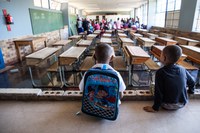Calls for policy certainty on undocumented learners
Yet the Department of Home Affairs remains unmoved. Departmental spokesperson Thabo Mogola told Parlybeat: “You cannot use emotion when applying the law. The law is the law and it states that every foreign national in the country must be documented.” The roundtable discussion followed the conclusion of the public participation process for the proposed Draft Regulations on the Registration of Births and Deaths Act in November last year. If approved these regulations will mean that undocumented children will no longer be issued with a birth certificate but a confirmation of birth document that is not considered a legal document. Some civil society organisations fear this will exacerbate the vulnerability of these children given existing challenges with their status. Director of legal services in the department of Home Affairs Adv Tsietsi Sebelemetia told Parlybeat the public comments are still being considered. He also explained the legislative process will resume in the 6th Parliament because regulations are secondary legislation and does not lapse like bills when Parliament rises. The organisation Lawyers for Human Rights in their submission on the draft regulations said issuing a confirmation of birth document violates the constitution and aims to exclude these children.
According to Moyo, however, these regulations do not address broader systemic issues. Presently the birth of a child born to foreign nationals can only be registered if the parents are legally documented. “The department wants to punish undocumented parents but they’re actually just punishing the children.” Moyo also referred to systemic challenges that makes it difficult for parents to get legal documents. She singled out the closure of some refugee reception offices that resulted in major backlogs. She said there is a lack of understanding of how these people acquire documents and the challenges they face in doing so. “So, we need more awareness and engagement between school governing bodies, the departments of education and home affairs. Even saying that schools should provisionally enrol these learners pending the application process, is problematic. It often takes much longer than 3 months to get documents.”
Challenges also remain for undocumented foster children born to foreign nationals and who are wards of the state. Manager at Lawrence House, Giulia Treves said there are also the issue of these foster children turning 18 before matric. Lawrence House is a residential facility for children in need of protection. “It becomes very complicated because at age 18 the child is not a ward of the state anymore. Treves said she finds it difficult to understand how the government can take responsibility for a child for years and then just put them out on the street.
Yet according to Mokgola a child that is illegal in the country must be treated in terms of the law. “The onus is on the parents or caregivers to make sure they are in the country legally so that the child can be documented.” He also insists the department’s systems are working as it should. Spokesperson for the Department of Basic Education Elijah Mhlanga said they are not aware of cases of intimidation, but it is possible these cases were reported to provincial departments. Mhlanga said every learner needs a birth certificate or ID to be admitted in schools. “It is highly irregular and in fact irresponsible of anybody to allow a child to stay in school without an identity document because without it children are deprived of services,” he said. “The insistence on access to education is noble but doing so without ensuring that the child is properly accounted for in the records is wrong.”
Meanwhile the Human Rights Commission again expressed concern that learners continue to be turned away from schools. Commissioner Andre Gaum reiterated that the right to basic education, as a core obligation, is in no way conditional on legal status or documentation for the purpose of identification. “Schools should not be used as a mechanism for immigration control, and education – as a fundamental right – cannot be withheld in order to ensure compliance with laws such as the Birth and Deaths Registration Act and the National Admissions Policy.”
This week's articles
Glitches in online system adding to NPOs’ woes
Don’t politicise our grief, moms warn SAPS and politicians

